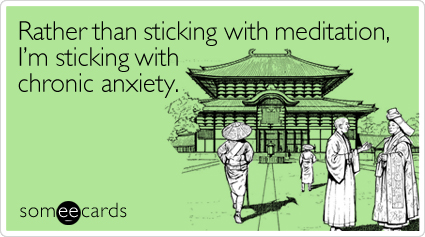
Coloring aside (and other “active meditation,” I guess), there is something that I hate about meditation (guided imagery especially). Deep breathing maybe helps me when I’m starting to freak out, but I think that’s because I’m telling myself “chill, take a moment, calm down, relax, collect yourself, you’ll be okay.” However, breathing deeply does stop my heart from beating so quickly.
Meditation is different though. I think it’s frustrating and I feel so impatient with it. It’s supposed to be calming, but really it just wears on my attention span and my nerves. It’s like when you’re stuck sitting at a red-light in the middle of the night, and are the only car there. You are watching that light and a minute goes by…. another minute… and you start thinking, “Seriously? You have to be kidding.” Another minute goes by and you are convinced the thing is broken. FINALLY the light changes.
I’ve had several therapistic explanations for this:
- I think I am a human doing, rather than a human being.
- I am uncomfortable sitting with myself.
- Meditating is letting my guard down and I am afraid to make myself that vulnerable.
- That’s my eating disorder talking (which I don’t think is really even relevant in this situation, but I swear there are therapists who say this about everything)
I think I can sit with myself and be calm. I love long car rides, coloring, napping, walking the dog… if you don’t count any of these “sitting with yourself and being a human being,” then what else besides meditation fits into this category?
When I am feeling panicky and anxious, meditation is about the last thing in the world that I want to do. It sounds so wrong when you state it this way, but some degree of anxiety is less painful than meditation! I think it’s great that meditation is calming and refreshing for some people… but I am convinced that meditation is not for everyone, and that it’s not necessarily a symptom of mental illness.


